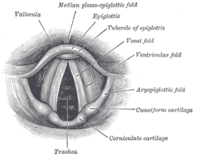
Photo from wikipedia
Purpose The aim of the study was to develop a treatment for athletes with paradoxical vocal fold motion disorder (PVFMD) based on exercise physiology and learning theory principles and administer… Click to show full abstract
Purpose The aim of the study was to develop a treatment for athletes with paradoxical vocal fold motion disorder (PVFMD) based on exercise physiology and learning theory principles and administer it over a preestablished time frame. Method A prospective, repeated-measures, within-subject group design was used. Eleven adolescent/teen athletes diagnosed with PVFMD via laryngoscopy received short-term intensive (STI) therapy. Eight of the athletes returned for extended follow-up. Changes in postexercise inspiratory ( R i) and expiratory ( R e) resistances and Modified Borg Dyspnea Scale (MBDS) ratings collected at baseline were compared immediately posttreatment and at extended follow-up. Dyspnea Index scores were collected at baseline and at extended follow-up. Two no-treatment control athletes with PVFMD participated in two exercise challenges-baseline and 6 weeks later. Results Immediately after STI therapy, athletes attained significant improvement in R i, R e, and MBDS ratings. These changes were maintained at extended follow-up as well as a significant change in Dyspnea Index scores. The 2 control athletes who were reassessed 6 weeks after baseline experienced negative changes in postexercise R i and MBDS ratings. Conclusion STI therapy that incorporated individuality, specificity, and variable practice effectively changed outcome measures posttreatment with further improvement observed at extended follow-up. These results provide preliminary evidence for STI therapy for PVFMD.
Journal Title: American journal of speech-language pathology
Year Published: 2019
Link to full text (if available)
Share on Social Media: Sign Up to like & get
recommendations!